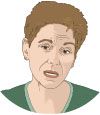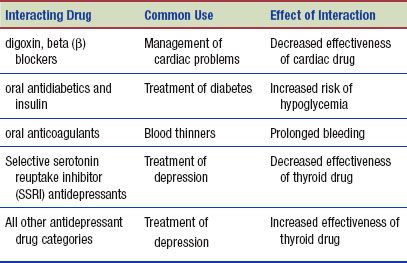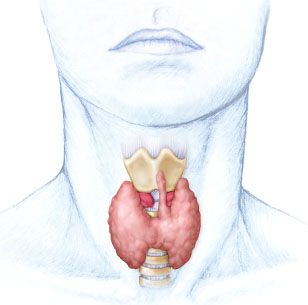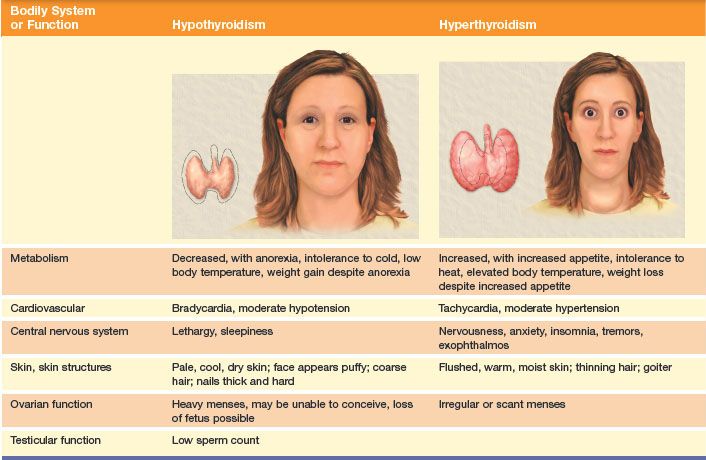DRUG CLASSES
Antithyroid drugs
Thyroid hormones
The thyroid gland is located in the neck in front of the trachea (Fig. 44.1). This highly vascular gland manufactures and secretes two hormones: thyroxine (T4) and tri-iodothyronine (T3). These hormones help to control body metabolism. When the thyroid functions properly this is known as a euthyroid (normal thyroid) state. When the thyroid does not work correctly one of two conditions related to the hormone-producing activity of the thyroid gland may occur:
• Hypothyroidism—a decrease in the amount of thyroid hormones manufactured and secreted
• Hyperthyroidism—an increase in the amount of thyroid hormones manufactured and secreted
PHARMACOLOGY IN PRACTICE

Betty Peterson’s neighbor will receive a dose of radioactive iodine for a hyperthyroid illness. Betty is concerned about bringing her daughter’s new baby home, thinking that her neighbor may be radioactive after the procedure. Learn in this chapter how to respond to Betty’s concerns.
In a normal functioning thyroid, when the level of circulating thyroid hormone decreases, the anterior pituitary secretes thyroid-stimulating hormone (TSH), which then activates the cells of the thyroid to release stored thyroid hormones. This process is an example of the feedback mechanism described in Chapter 43.
When a disease such as Hashimoto’s thyroiditis causes hypothyroidism, thyroid hormones are taken for supplement until the condition can be corrected. When the patient has a condition such as Grave’s disease (autoimmune disorder), the thyroid gland works harder to produce hormone and individuals may develop a goiter. Hyperthyroidism is also caused by inflammation and is called thyrotoxicosis. If the condition, such as hyperthyroidism, is due to pregnancy and is correctable, it may be treated with one of the antithyroid drugs. If the condition is not correctable, then radioactive iodine is swallowed to destroy the thyroid so it stops overproducing the hormones. In some cases the thyroid is removed surgically; however, it is more difficult to remove the entire gland.
Unfortunately, when the thyroid is surgically or radiologically removed, the patient becomes hypothyroid, and without a functioning thyroid the individual must take thyroid supplements for the remainder of his or her life. The symptoms of hypothyroidism and hyperthyroidism are described in Table 44.1.
Thyroid hormones used as supplements include both the natural and synthetic hormones. The synthetic hormones are generally preferred because they are more uniform in potency than are the natural hormones obtained from animals. Thyroid hormones are listed in the Summary Drug Table: Thyroid and Antithyroid Drugs.
Actions
The thyroid hormones influence every organ and tissue of the body. These hormones increase the metabolic rate of tissues, which results in increases in the heart and respiratory rate, body temperature, cardiac output, oxygen consumption, and the metabolism of fats, proteins, and carbohydrates. The exact mechanisms by which the thyroid hormones exert their influence on body organs and tissues are not well understood.
Uses
Thyroid hormones are used in the treatment or prevention of hypothyroidism caused by the following:
• Subacute or chronic thyroiditis (Hashimoto’s disease or viral thyroiditis)
• Hormone supplement after hyperthyroid treatment
• Euthyroid goiter (enlargement of a normal thyroid gland)
• Thyroid nodules and multinodular goiter
• Some types of depression
• Thyroid cancer
Levothyroxine (Synthroid) is the drug of choice for hypothyroidism, because it is relatively inexpensive, requires once-a-day dosage, and has a more uniform potency than do other thyroid hormone replacement drugs. Thyroid hormones also may be used as a diagnostic measure to differentiate suspected hyperthyroidism from euthyroidism.
 NURSING ALERT
NURSING ALERT
Thyroid hormone replacement drugs are not equivalent to each other. Patients should not change brands or types of thyroid hormone without first checking with the primary health care provider. The primary health care provider needs to determine the equivalent dosages when changing medication brands.
Adverse Reactions
Treatment of hypothyroidism is based on individualized doses of the hormone. During initial therapy, the most common adverse reactions are signs of overdose and hyperthyroidism as titration of the drug is being attempted (see Table 44.1). Adverse reactions other than symptoms of hyperthyroidism are rare.
Contraindications and Precautions
These drugs are contraindicated in patients with known hypersensitivity to the drug, an uncorrected adrenal cortical insufficiency, or thyrotoxicosis. These drugs should not be used as a treatment for obesity or infertility. Thyroid hormone should not be used after a recent myocardial infarction. When hypothyroidism is a cause or contributing factor to a myocardial infarction or heart disease, the physician may prescribe small doses of thyroid hormone.
These drugs are used cautiously in patients with cardiac disease and during lactation. Thyroid hormones are classified as pregnancy category A and should be continued by hypothyroid women during pregnancy.
Interactions
The following interactions may occur with thyroid hormones:

Antithyroid drugs or thyroid antagonists are used to treat hyperthyroidism. In addition to the antithyroid drugs, hyperthyroidism may be treated by the use of radioactive iodine (131I), or by surgical removal of some or almost all of the thyroid gland (subtotal thyroidectomy).
Actions
Antithyroid drugs inhibit the manufacture of thyroid hormones. They do not affect existing thyroid hormones circulating in the blood or stored in the thyroid gland. For this reason, therapeutic effects of the antithyroid drugs may not be observed for 3 to 4 weeks. Antithyroid drugs are listed in the Summary Drug Table: Thyroid and Antithyroid Drugs.
Radioactive iodine (131I) is used because the thyroid has an affinity for iodine. The radioactive isotope accumulates in the cells of the thyroid gland, where destruction of thyroid cells occurs without damaging other cells throughout the body.
Although using isotopes is preferable, it may not be recommended for all patients; therefore, a thyroidectomy may be necessary. Antithyroid drugs may be administered before surgery to return the patient temporarily to a euthyroid state. When used for this reason, the vascularity of the thyroid gland is reduced typically using potassium iodide, and the tendency to bleed excessively during and immediately after surgery is decreased.
Uses
Methimazole (Tapazole) and propylthiouracil (PTU) are used for the medical management of hyperthyroidism. Potassium iodide may be given orally with methimazole or propylthiouracil to prepare for thyroid surgery. Radioactive iodine (131I) is used for treatment of hyperthyroidism and cancer of the thyroid. The drug is given orally either as a solution or in a gelatin capsule.
Adverse Reactions
Generalized System Reactions
• Hay fever, sore throat, skin rash, fever, headache
• Nausea, vomiting, paresthesias
Severe System Reactions
• Agranulocytosis (decrease in the number of white blood cells)
• Exfoliative dermatitis, granulocytopenia, hypoprothrombinemia
• Drug-induced hepatitis
Contraindications, Precautions, and Interactions
The antithyroid drugs are contraindicated in patients with hypersensitivity to the drug or any constituent of the drug. Mothers taking methimazole or propylthiouracil should not breastfeed their children. Radioactive iodine (pregnancy category X) is contraindicated during pregnancy and lactation.
Methimazole and propylthiouracil are used with extreme caution during pregnancy (pregnancy category D) because they can cause hypothyroidism in the fetus. However, if an antithyroid drug is necessary during pregnancy, propylthiouracil is the preferred drug, because it does not cross the placenta. The potential for bleeding increases when these products are taken with oral anticoagulants.
NURSING PROCESS
PATIENT RECEIVING AN UPPER RESPIRATORY SYSTEM DRUG
ASSESSMENT
Preadministration Assessment
Often a patient is diagnosed with hyperthyroidism, is treated and becomes hypothyroid, and subsequently requires supplementation. Nursing care described here covers the entire continuum of that care. Before a patient starts therapy with either an antithyroid drug or a thyroid hormone, document the history of thyroid-related symptoms (see Table 44.1). It is important to include vital signs, weight, and a notation regarding the subjective symptoms felt by the patient. Lab work will include measuring the TSH as well as T3 and T4 levels. When thyroid dysfunction is suspected, serum thyroid antibodies and the TSH level are the best indicators for treatment. If the patient is prescribed an iodine procedure, it is essential to ask about the allergy history, particularly to iodine or seafood (which contains iodine).
 LIFESPAN CONSIDERATIONS
LIFESPAN CONSIDERATIONS
Gerontology
Hypothyroidism may be confused with other conditions associated with aging, such as depression, cold intolerance, weight gain, confusion, or unsteady gait. These symptoms should be thoroughly evaluated before thyroid treatment is started.
Stay updated, free articles. Join our Telegram channel

Full access? Get Clinical Tree




